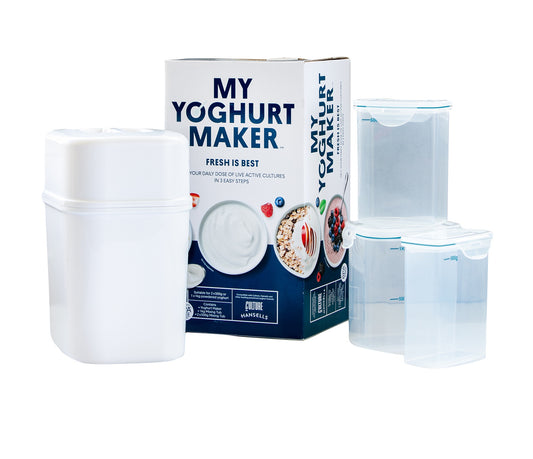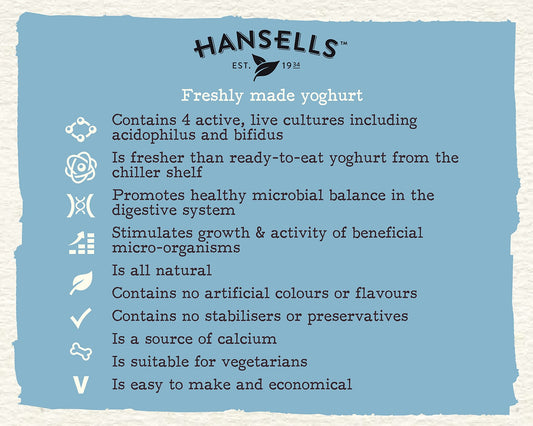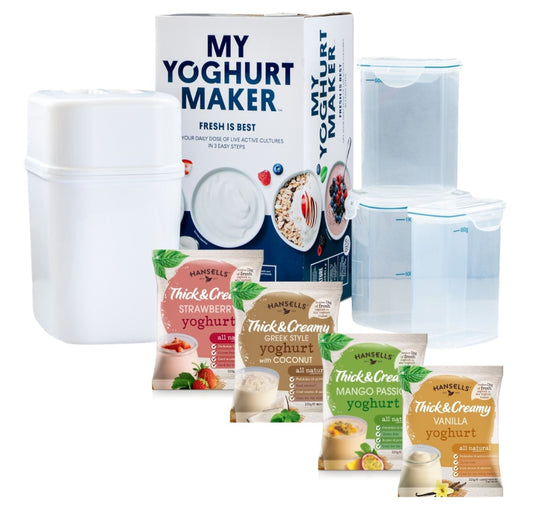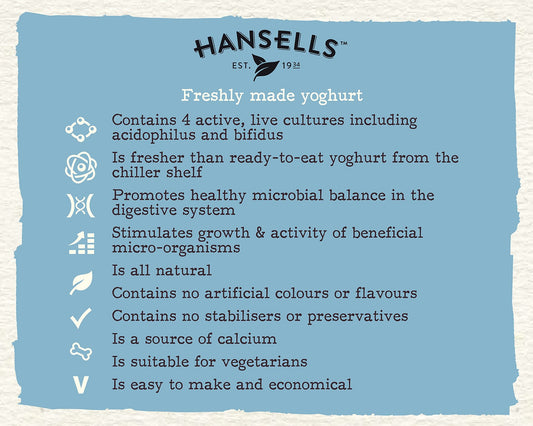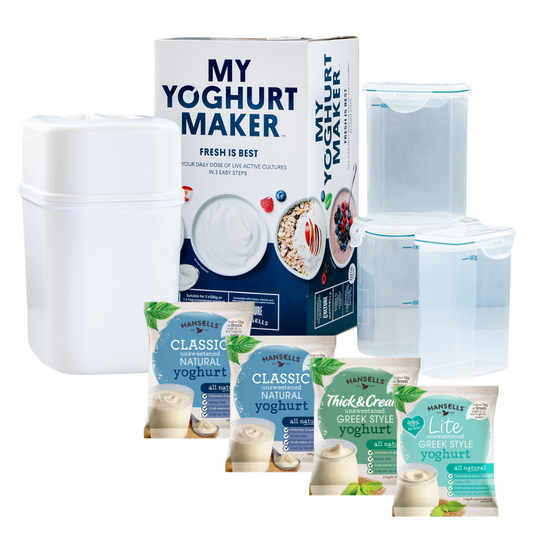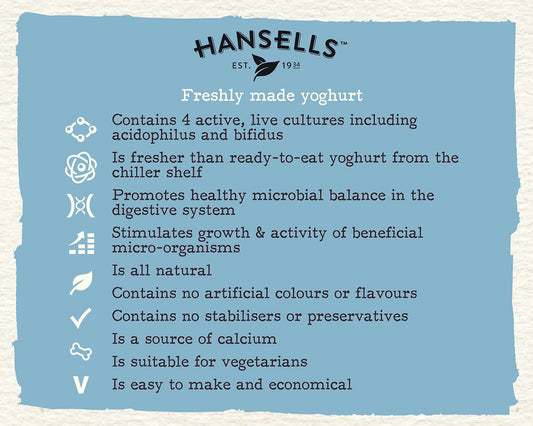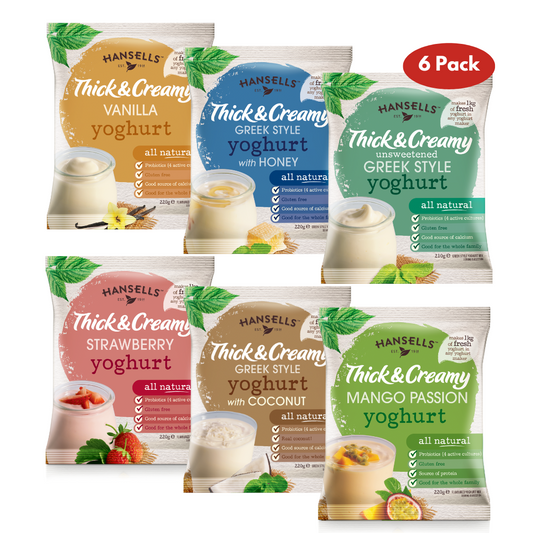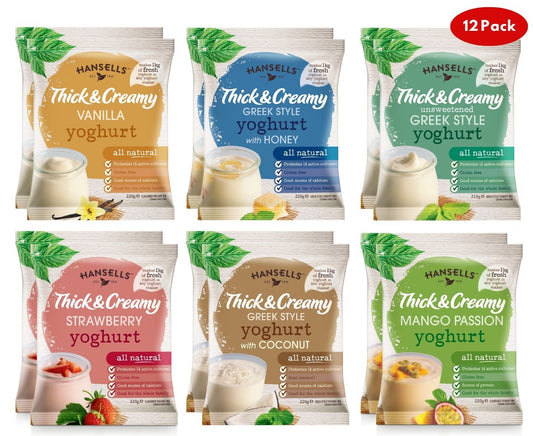Benefits

Benefits of Homemade Yoghurt
Yoghurt is a healthy and wholesome food for the whole family. To enjoy the optimal benefits of yoghurt, live and active cultures need to be present. Cultures have a short life, which is why freshly homemade yoghurt is the best way to ensure you will gain the full health benefits.
- Contains 4 active, live cultures including acidophilus and bifidus
- Is fresher than chilled ready-to-eat yoghurt from stores
- Promotes healthy microbial balance in the digestive system
- Stimulates growth & activity of beneficial micro-organisms
- Is easy to make, just add water
- Can be used in any yoghurt maker
- Is all natural
- Contains no artificial colours or flavours
- Contains no stabilisers or preservatives
- Is a source of calcium
- Is suitable for vegetarians
How is Yoghurt Made?
Milk is fermented by lactic acid bacteria (cultures; Lactobacillus bulgaricus and Streptococcus thermophilus). The milk proteins coagulate and set to form a thickened, acid food to which we know as ‘yoghurt’.
What are live and active Cultures?
The words ‘live and active cultures’ refer to the living organisms – Lactobacillus acidophilus and Bifidobacterium lactis. These beneficial bacterias are naturally present in the gut, manufacturing rich nutritional properties and positive functional components.
Benefits of Cultures?
The live and active cultures, lactic acid bacteria (LAB), in Hansells Yoghurt perform beneficial functions in the human body when consumed in adequate amounts.
- Aids the health of the intestinal tract by supporting healthy digestion
- Helps the body break down food
- Promotes a healthy balance between ‘friendly’ and ‘bad’ bacteria by stimulating the growth and activity of beneficial micro-organisms
- Boosts immunity
- Synthesises vitamins such as complex Vitamin B’s
- Helps breakdown lactose making yoghurt more suitable for people with (a mild) lactose intolerance
- May help reduce the effect of antibiotics on the good bacteria in the gut
Hansells Yoghurt contains 4 active, live cultures including Acidophilus and Bifidus (known as AB or A+B).
Yoghurt Nutrition?
Yoghurt is highly nutritious and a good source of essential nutrients including Protein, Calcium, Riboflavin, Thiamin, Vitamin A, E and natural fats.
Protein
Protein is responsible for the repairing, regulating and protecting every tissue in the human body. The milk solids in Hansells Yoghurt has more concentrated protein than liquid milk. The absorption of protein is also increased due to the presence of active lactic cultures.
Calcium
Calcium is critical for bone growth, development and maintenance at every age and stage of life. It also plays a role in the function of nerves, muscles, kidneys and the heart. Calcium plays a vital role in the prevention of Osteoporosis, which is a prevalent disease especially amongst women.
Vitamins
Riboflavin is a water-soluble B vitamin that helps produce energy in all cells in your body and is fundamental for the metabolism of fats, carbohydrates and protein.
Vitamin B1/Thiamin is a water-soluble B vitamin that helps cells in your body produce energy from carbohydrates. It is essential for the functioning of the heart, muscles and nervous system as it plays a role in conducting nerve impulses and in muscle contraction.
Vitamin A, a fat-soluble vitamin, is important for bone growth, reproduction, immune function and vision. Vitamin A helps your eyes to convert light into brain signals that allow you to observe images. It also plays a role in creating healthy white blood cells.
Vitamin E is a fat-soluble vitamin. It predominantly functions as an antioxidant, hence it helps prevent or reduce damage caused by free radicals, reducing the risk of health problems like heart disease or cancer.
Natural Fats
Fats are an essential part of a balanced diet. In addition to supplying energy to the body, natural fats also help to form structural material of cells and tissues such as the cell membrane.

TIPS
For a sweeter yoghurt: Add a tablespoon of caster sugar as you make up the yoghurt or
add a natural sugar alternative. Try stirring honey or fresh fruit after the yoghurt is set or when serving.
For more acidic yoghurt: Leave in the yoghurt maker for a few extra hours.
Featured collection
-
Yoghurt Maker - includes 3 tubs
Regular price £14.00 GBPRegular priceUnit price per -
Fruity Starter Kit x4 Sachets + Yoghurt Maker
Regular price £27.50 GBPRegular priceUnit price per -
Unsweetened Starter Kit - x4 Sachets + Yoghurt Maker
Regular price £27.50 GBPRegular priceUnit price per£0.00 GBPSale price £27.50 GBP -
Thick & Creamy Yoghurt - Mixed Pack x6 Sachets
Regular price £17.50 GBPRegular priceUnit price per -
Thick & Creamy Yoghurt - Mixed Pack x12 Sachets
Regular price £32.00 GBPRegular priceUnit price per


